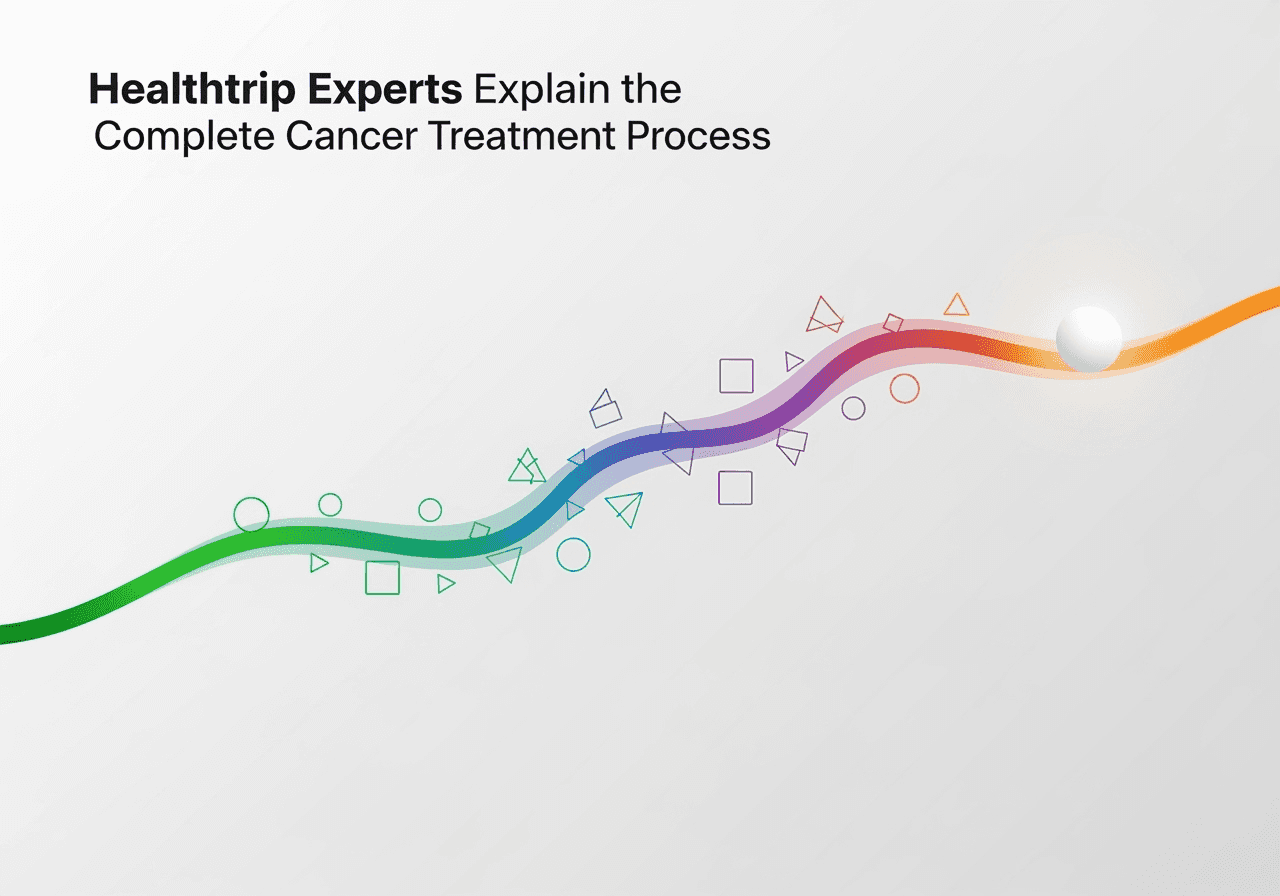
Healthtrip Experts Explain the Complete Cancer Treatment Process
30 Oct, 2025
 Healthtrip
Healthtrip- Where to Seek Cancer Treatment: Top Hospitals and Destinations
- Understanding The "Whys" of Cancer Treatment: Goals and Objectives < li>Who is Involved in Your Cancer Care: The Multidisciplinary Team
- How is Cancer Diagnosed and Staged: A Comprehensive Overview
- Exploring Different Cancer Treatment Modalities: From Surgery to Immunotherapy
- Managing Side Effects and Supportive Care During Cancer Treatment < li>Cancer Treatment Success Stories and Examples: Inspiring Journeys
- Navigating the Cost of Cancer Treatment: Options and Considerations
- Conclusion: Embracing Hope and Informed Decisions in Your Cancer Journey
Understanding Cancer: The Basics
Before diving into the treatment process, it’s important to understand what cancer is. Simply put, cancer is a disease in which abnormal cells divide uncontrollably and destroy body tissue. These rogue cells can form tumors, disrupt bodily functions, and spread to other parts of the body, a process known as metastasis. Several factors can contribute to cancer development, including genetic predispositions, environmental exposures, and lifestyle choices. Early detection is crucial, as it often leads to more effective treatment outcomes. Regular screenings and awareness of potential symptoms are key in the fight against cancer. Knowing the type and stage of cancer is also crucial, as these factors greatly influence the treatment plan. Remember, early intervention is often the best defense, and staying informed is your strongest weapon. Healthtrip can connect you with renowned oncologists who can provide personalized insights and guidance throughout your cancer journey, potentially at leading hospitals like Memorial Sisli Hospital or even facilitate exploring options at facilities such as Yanhee International Hospital for certain specialized treatments.
Most popular procedures in India
Diagnosis and Staging
The diagnostic process is typically the first step after noticing some unusual changes in your body. It often begins with a physical exam and a review of your medical history. If your doctor suspects cancer, they may order a variety of tests, including imaging scans (like X-rays, CT scans, MRIs, and PET scans), blood tests, and biopsies. A biopsy involves taking a small sample of tissue for examination under a microscope to determine if cancer cells are present. Once a diagnosis is confirmed, the cancer is staged. Staging helps determine the extent of the cancer, including the size of the tumor, whether it has spread to nearby lymph nodes, and if it has metastasized to other parts of the body. The stage of the cancer is a crucial factor in determining the most appropriate treatment plan. This comprehensive assessment ensures that your treatment is tailored to your specific needs. With Healthtrip, you can easily access expert diagnostic services at hospitals like Saudi German Hospital Cairo, Egypt, ensuring a thorough and accurate assessment of your condition. Our network provides access to cutting-edge diagnostic technologies and experienced medical professionals to guide you through this critical phase.
Treatment Options: A Comprehensive Overview
Cancer treatment has evolved significantly in recent years, offering a range of options tailored to the specific type and stage of cancer, as well as the individual's overall health. The primary treatment modalities include surgery, chemotherapy, radiation therapy, targeted therapy, immunotherapy, and hormone therapy. Surgery involves the physical removal of the tumor and may be used alone or in combination with other treatments. Chemotherapy utilizes powerful drugs to kill cancer cells throughout the body, while radiation therapy uses high-energy rays to target and destroy cancer cells in a specific area. Targeted therapy focuses on specific molecules involved in cancer cell growth and survival, while immunotherapy boosts the body's own immune system to fight cancer. Hormone therapy is used for cancers that are sensitive to hormones, such as breast and prostate cancer. The choice of treatment approach depends on various factors, and a multidisciplinary team of specialists will typically collaborate to develop a personalized treatment plan. Healthtrip can assist you in connecting with experienced oncologists and accessing advanced treatment options at renowned hospitals like Bangkok Hospital and Hisar Intercontinental Hospital.
Wellness Treatments
Give yourself the time to relax
Lowest Prices Guaranteed!

Lowest Prices Guaranteed!
Surgery
Surgery is often a primary treatment option for solid tumors that are localized and haven't spread extensively. The goal of surgery is to remove as much of the cancerous tissue as possible while preserving healthy tissue and organ function. Depending on the type and location of the cancer, surgery can range from minimally invasive procedures to more extensive operations. Minimally invasive techniques, such as laparoscopic or robotic surgery, involve smaller incisions, resulting in less pain, shorter hospital stays, and faster recovery times. However, not all cancers are amenable to surgery, particularly if they have spread to distant sites or are located in critical areas. In such cases, surgery may be used in combination with other treatments like chemotherapy or radiation therapy. The decision to undergo surgery is a complex one that requires careful consideration of the potential benefits and risks. With Healthtrip, you can find experienced surgeons at top hospitals like Mount Elizabeth Hospital who specialize in various cancer types and surgical techniques, ensuring you receive the best possible care. Don't forget the importance of post-operative care, which is crucial for recovery and preventing complications.
Chemotherapy
Chemotherapy is a systemic treatment, meaning it affects the entire body. It involves the use of powerful drugs that target and kill rapidly dividing cells, including cancer cells. Chemotherapy drugs can be administered orally or intravenously, and the treatment schedule varies depending on the type and stage of cancer. While chemotherapy is effective in killing cancer cells, it can also affect healthy cells, leading to side effects such as nausea, vomiting, fatigue, hair loss, and decreased immune function. These side effects can be managed with supportive care medications and lifestyle modifications. Chemotherapy is often used in combination with other treatments like surgery and radiation therapy. In some cases, it may be used before surgery to shrink the tumor (neoadjuvant chemotherapy) or after surgery to kill any remaining cancer cells (adjuvant chemotherapy). With Healthtrip, you can access chemotherapy treatment at leading cancer centers like National Cancer Centre Singapore, where experienced oncologists can tailor the chemotherapy regimen to your specific needs while managing side effects effectively. Remember, support and open communication with your healthcare team are crucial during chemotherapy.
Radiation Therapy
Radiation therapy uses high-energy rays or particles to damage and destroy cancer cells. It can be delivered externally, using a machine that directs radiation beams at the tumor, or internally, by placing radioactive materials directly into or near the tumor. External beam radiation therapy is the most common type and is typically painless. Internal radiation therapy, also known as brachytherapy, involves implanting radioactive seeds or wires into the tumor, delivering a concentrated dose of radiation while sparing surrounding healthy tissue. Radiation therapy can be used alone or in combination with other treatments like surgery and chemotherapy. It's often used to treat localized cancers or to relieve symptoms caused by advanced cancers. Side effects of radiation therapy depend on the treatment area and can include skin irritation, fatigue, and organ-specific effects. With Healthtrip, you can explore advanced radiation therapy options at specialized centers like QUIRONSALUD PROTON THERAPY CENTRE, where you have the option of proton therapy. Our network can connect you with leading radiation oncologists who can personalize your treatment plan and manage any potential side effects. Remember, a collaborative approach ensures the best possible outcome.
Targeted Therapy
Targeted therapy is a type of cancer treatment that focuses on specific molecules involved in cancer cell growth, progression, and spread. Unlike chemotherapy, which affects all rapidly dividing cells, targeted therapy is designed to selectively target cancer cells while minimizing damage to normal cells. This approach can lead to fewer side effects compared to traditional chemotherapy. Targeted therapies can work in various ways, such as blocking signals that tell cancer cells to grow, preventing the formation of new blood vessels that feed tumors, or delivering toxic substances directly to cancer cells. These treatments are often used in combination with other therapies, such as chemotherapy or radiation therapy, to enhance their effectiveness. The use of targeted therapy depends on the specific genetic or molecular characteristics of the cancer. Healthtrip can connect you with experts at hospitals like Fortis Hospital, Noida who specialize in identifying appropriate targeted therapies for your specific type of cancer. Genetic testing and personalized medicine are key aspects of this innovative approach.
Immunotherapy
Immunotherapy harnesses the power of the body's own immune system to fight cancer. It works by stimulating or enhancing the immune system's ability to recognize and destroy cancer cells. There are several types of immunotherapy, including immune checkpoint inhibitors, which block proteins that prevent the immune system from attacking cancer cells; adoptive cell transfer, which involves collecting and modifying immune cells to better target cancer cells; and cancer vaccines, which stimulate the immune system to recognize and attack cancer cells. Immunotherapy has shown remarkable success in treating certain types of cancer, such as melanoma, lung cancer, and kidney cancer. However, it's not effective for all types of cancer, and it can cause side effects related to immune system activation. The use of immunotherapy depends on the specific characteristics of the cancer and the individual's immune system. Healthtrip can help you explore immunotherapy options at leading cancer centers and connect with experts who can determine if immunotherapy is right for you. Monitoring the immune response and managing potential side effects are crucial aspects of immunotherapy.
Hormone Therapy
Hormone therapy is used to treat cancers that are sensitive to hormones, such as breast and prostate cancer. These cancers rely on hormones, like estrogen or testosterone, to grow and thrive. Hormone therapy works by blocking the effects of these hormones or reducing their production, thereby slowing or stopping the growth of cancer cells. For example, in breast cancer, hormone therapy may involve blocking estrogen receptors on cancer cells or using medications that lower estrogen levels in the body. In prostate cancer, hormone therapy may involve blocking androgen receptors or using medications that reduce testosterone production. Hormone therapy can be administered orally or through injections, and the treatment duration varies depending on the type and stage of cancer. Side effects of hormone therapy depend on the specific medication and can include hot flashes, fatigue, weight gain, and decreased bone density. Healthtrip can connect you with specialists at facilities like Taoufik Hospitals Group, Tunisia who can develop a personalized hormone therapy plan to manage your specific cancer. Regular monitoring and management of side effects are essential for successful hormone therapy.
Supportive Care: Managing Side Effects and Improving Quality of Life
Cancer treatment can be physically and emotionally demanding, and managing side effects is an essential part of the treatment process. Supportive care focuses on relieving symptoms and improving the overall quality of life for cancer patients. This includes medications to manage pain, nausea, fatigue, and other side effects, as well as nutritional support, psychological counseling, and physical therapy. Pain management is a crucial aspect of supportive care, and various strategies can be used to alleviate pain, including medications, nerve blocks, and complementary therapies. Nutritional support helps patients maintain their strength and energy levels during treatment, while psychological counseling provides emotional support and coping strategies for managing stress, anxiety, and depression. Physical therapy can help patients regain strength, mobility, and function after surgery or radiation therapy. Healthtrip understands the importance of holistic care and can connect you with comprehensive support services at hospitals like LIV Hospital, Istanbul. Open communication with your healthcare team is essential to address any concerns and ensure your comfort throughout the treatment process. Remember, seeking help is a sign of strength, and prioritising your well-being is crucial during this challenging time.
The Importance of Follow-Up Care and Survivorship
Even after completing cancer treatment, regular follow-up care is crucial to monitor for any signs of recurrence and manage any long-term side effects. Follow-up appointments typically involve physical exams, imaging scans, and blood tests. The frequency of these appointments depends on the type and stage of cancer, as well as the individual's overall health. Survivorship care also includes addressing any emotional, social, and practical challenges that cancer survivors may face. This may involve counseling, support groups, and resources for managing financial and employment issues. Cancer survivorship is an ongoing process that requires a proactive approach to maintaining health and well-being. Healthtrip recognizes the importance of long-term support and can connect you with comprehensive survivorship programs at hospitals such as Max Healthcare Saket. Remember, transitioning from treatment to survivorship is a significant milestone, and continued care is essential to thrive in the years to come. Empowering yourself with knowledge and building a strong support network are key to a fulfilling life after cancer.
Where to Seek Cancer Treatment: Top Hospitals and Destinations
Embarking on a cancer treatment journey is a significant decision, and choosing the right hospital and destination is paramount. It's more than just picking a place; it's about finding a center that aligns with your specific needs, values, and preferences. Factors to consider include the hospital's specialization in your type of cancer, its success rates, the availability of cutting-edge technologies, and the expertise of its medical team. But it's also about the overall environment – does the hospital offer comprehensive supportive care services? Does it feel like a place where you can find both healing and hope? Consider institutions like Fortis Memorial Research Institute in Gurgaon, India, known for its advanced oncology department and patient-centric approach, or perhaps the National Cancer Centre Singapore, a regional leader in cancer research and treatment. In Turkey, Memorial Sisli Hospital and LIV Hospital, Istanbul, offer comprehensive cancer care with a focus on international patients. In Spain, the Quironsalud Proton Therapy Centre stands out for its innovative treatment options. Remember, Healthtrip can assist you in navigating these choices, providing detailed information and facilitating connections with top hospitals and specialists worldwide, ensuring you feel confident and supported every step of the way.
Navigating Your Options with Healthtrip
Healthtrip is your trusted partner in making informed decisions about cancer treatment. We understand that facing a cancer diagnosis can be overwhelming, and navigating the complex world of medical options can feel daunting. That's where we come in. We provide a comprehensive platform to research hospitals and destinations, compare treatment options, and connect with leading oncologists. We also understand that travelling for medical treatment can present logistical challenges. We assist with travel arrangements, accommodation, and language interpretation, ensuring a smooth and stress-free experience. Our goal is to empower you to make the best choices for your health and well-being, giving you the peace of mind to focus on your recovery. Consider options like Bangkok Hospital in Thailand, renowned for its holistic approach to cancer care or perhaps closer to home, Saudi German Hospital Cairo, Egypt. We also will consider your budget to provide you with the best facilities that are affordable to you. No matter your requirements, Healthtrip will come through for you.
Understanding The "Whys" of Cancer Treatment: Goals and Objectives
Before diving into the "how" of cancer treatment, it's crucial to understand the "why." What are the goals and objectives of your treatment plan? This discussion should be a collaborative effort between you and your medical team. Are you aiming for a cure, where the cancer is completely eradicated? Or is the goal to control the cancer, preventing it from spreading and managing its symptoms? Perhaps the focus is on palliative care, aimed at relieving pain and improving your quality of life. These different goals will shape the direction of your treatment. For instance, aggressive therapies like surgery, chemotherapy, or radiation might be employed for curative intent. In contrast, targeted therapies or hormone therapy might be used to control cancer growth. Importantly, understanding your goals empowers you to actively participate in decisions about your care. It's okay to ask questions, express concerns, and share your personal values and priorities. Remember, your treatment plan should be tailored to your individual needs and circumstances, not just based on a textbook definition of cancer.
Factors Influencing Treatment Goals
Many factors influence the goals and objectives of cancer treatment. The type and stage of cancer are primary determinants. A localized cancer detected early may have a higher chance of being cured with surgery or radiation. However, advanced cancers that have spread to other parts of the body may require a more comprehensive approach, combining multiple therapies to control the disease and extend life. Your overall health and well-being also play a significant role. Pre-existing medical conditions or other health issues can impact your tolerance to certain treatments. Your age, lifestyle, and personal preferences are also considered. Some patients prioritize aggressive treatment for the best chance of a cure, while others may opt for less intensive options that minimize side effects and preserve their quality of life. It's crucial to have open and honest conversations with your oncologist about these factors to create a treatment plan that is both effective and aligned with your personal values.
Who is Involved in Your Cancer Care: The Multidisciplinary Team
Cancer care is rarely a solo journey; it's a team effort. A multidisciplinary team of specialists works together to provide comprehensive care. The core team typically includes a medical oncologist, who oversees your overall treatment plan and administers chemotherapy and other systemic therapies; a surgical oncologist, who performs surgeries to remove tumors; and a radiation oncologist, who delivers radiation therapy to target cancer cells. But the team extends far beyond these specialists. You might also interact with radiologists, who interpret imaging scans to diagnose and monitor the cancer; pathologists, who analyze tissue samples to determine the type and characteristics of the cancer; and nurses, who provide direct patient care, administer medications, and offer emotional support. Furthermore, your team can include dietitians, who provide nutritional guidance; physical therapists, who help you regain strength and mobility; social workers, who offer counseling and support services; and palliative care specialists, who focus on managing pain and other symptoms. This collaborative approach ensures that all aspects of your well-being are addressed, leading to a more holistic and effective treatment experience.
The Patient as Part of the Team
Importantly, you are the most vital member of the cancer care team. Your voice, your concerns, and your preferences are central to the decision-making process. Don't hesitate to ask questions, seek clarification, and express your thoughts and feelings. A good healthcare team will value your input and work collaboratively with you to create a treatment plan that aligns with your goals and values. Moreover, involving your family and loved ones can provide additional support and advocacy. They can attend appointments with you, help you remember important information, and offer emotional encouragement. Building a strong support network, both within and outside the medical setting, can significantly enhance your resilience and well-being throughout the cancer treatment journey. Healthtrip recognizes the importance of this team approach and strives to connect you with hospitals and specialists who prioritize communication, collaboration, and patient-centered care. Think of the teams at The Royal Marsden Private Care, London or Mount Elizabeth Hospital in Singapore, where coordinated care is a hallmark of their service.
Also Read:
How is Cancer Diagnosed and Staged: A Comprehensive Overview
Embarking on the cancer treatment journey begins with a critical step: diagnosis and staging. It's like detectives piecing together clues to understand the extent of the disease and chart the best course of action. The journey typically begins when symptoms arise or during a routine screening, prompting a visit to the doctor. This initial consultation is crucial; your doctor will delve into your medical history, conduct a physical examination, and order specific tests based on your symptoms and risk factors. These tests can range from simple blood work to sophisticated imaging techniques, each providing a piece of the puzzle. Imaging tests like X-rays, CT scans, MRIs, and PET scans offer a visual glimpse inside the body, revealing any abnormal growths or masses. Biopsies, where a tissue sample is extracted and examined under a microscope, are often the gold standard for confirming a cancer diagnosis. This microscopic analysis not only identifies the presence of cancer cells but also determines the specific type of cancer, which is crucial for tailoring treatment strategies.
Once a cancer diagnosis is confirmed, the next crucial step is staging. Cancer staging is a standardized system used to describe the extent of the cancer, including the size of the tumor, whether it has spread to nearby lymph nodes, and if it has metastasized (spread to distant parts of the body). The most common staging system is the TNM system, where T stands for tumor size, N for node involvement, and M for metastasis. Each component is assigned a number, indicating the severity. For instance, a T1 tumor might be a small, localized growth, while a T4 tumor could be larger and potentially invading nearby tissues. Similarly, N0 indicates no lymph node involvement, while N3 suggests significant spread to multiple lymph nodes. The M category indicates whether the cancer has spread to distant sites; M0 means no metastasis, while M1 signifies that the cancer has spread to other parts of the body. The information gathered from the TNM assessment is then used to determine an overall stage, typically ranging from stage 0 to stage IV. Stage 0 often indicates cancer in situ, meaning it’s confined to the original location and hasn't spread. Stage IV, on the other hand, indicates advanced, metastatic cancer. Understanding the stage of your cancer is vital because it directly influences treatment options and helps predict prognosis. It's a roadmap, guiding the healthcare team in making informed decisions about the most effective strategies to combat the disease and improve outcomes. You might seek expert diagnosis at hospitals like Fortis Memorial Research Institute, Gurgaon https://www.healthtrip.com/hospital/fortis-memorial-research-institute or Quironsalud Hospital Murcia https://www.healthtrip.com/hospital/quironsalud-hospital-murcia.
Exploring Different Cancer Treatment Modalities: From Surgery to Immunotherapy
The landscape of cancer treatment is vast and ever-evolving, offering a range of modalities designed to target cancer cells in various ways. Surgery, often the first line of defense for solid tumors, involves the physical removal of the cancerous tissue and, in some cases, surrounding healthy tissue to ensure complete eradication. This approach is most effective when the cancer is localized and hasn't spread to distant sites. Radiation therapy uses high-energy beams, such as X-rays or protons, to damage the DNA of cancer cells, preventing them from growing and dividing. It can be delivered externally, using a machine that directs radiation at the tumor, or internally, by placing radioactive materials directly into or near the cancer. Chemotherapy, a systemic treatment, employs drugs to kill cancer cells throughout the body. These drugs can be administered orally or intravenously, targeting rapidly dividing cells, which is a hallmark of cancer. However, because chemotherapy affects all rapidly dividing cells, it can also lead to side effects such as hair loss, nausea, and fatigue. Hormone therapy is used to treat cancers that are sensitive to hormones, such as breast and prostate cancer. These therapies work by blocking the body's ability to produce hormones or by interfering with the effects of hormones on cancer cells. Targeted therapy, a more precise approach, involves drugs that target specific molecules or pathways involved in cancer cell growth and survival. Unlike chemotherapy, targeted therapies are designed to affect cancer cells while minimizing harm to normal cells, leading to fewer side effects.
Immunotherapy, one of the most exciting advancements in cancer treatment, harnesses the power of the body's own immune system to fight cancer. This approach includes various strategies, such as immune checkpoint inhibitors, which block proteins that prevent immune cells from attacking cancer cells, and adoptive cell therapy, where immune cells are collected, modified to better recognize and attack cancer cells, and then infused back into the patient. Each treatment modality has its own set of benefits and risks, and the choice of treatment depends on several factors, including the type and stage of cancer, the patient's overall health, and personal preferences. Often, a combination of treatments is used to achieve the best possible outcome. For example, surgery might be followed by chemotherapy or radiation therapy to eliminate any remaining cancer cells. Immunotherapy might be used in conjunction with targeted therapy to enhance the immune response. The future of cancer treatment is likely to involve even more personalized approaches, where treatments are tailored to the individual characteristics of each patient's cancer. Hospitals like National Cancer Centre Singapore https://www.healthtrip.com/hospital/national-cancer-centre-singapore, Bangkok Hospital https://www.healthtrip.com/hospital/bangkok-hospital and Quironsalud Proton Therapy Centre https://www.healthtrip.com/hospital/quironsalud-proton-therapy-centre provide advanced cancer treatment modalities.
Also Read:
Managing Side Effects and Supportive Care During Cancer Treatment
Cancer treatment, while essential for combating the disease, often comes with a range of side effects that can significantly impact a patient's quality of life. Managing these side effects and providing comprehensive supportive care are integral parts of the cancer treatment journey. Side effects vary depending on the type of treatment, the location of the cancer, and the individual's overall health. Common side effects include nausea, vomiting, fatigue, pain, hair loss, skin changes, and changes in appetite. Effective management of these side effects requires a proactive and personalized approach. Medications can help alleviate nausea and vomiting, while pain management strategies may involve pain relievers, nerve blocks, or other interventions. Fatigue, a common complaint, can be addressed through exercise, rest, and supportive therapies. Nutritional support is also crucial, as changes in appetite and taste can lead to weight loss and malnutrition. Working with a registered dietitian can help patients optimize their nutritional intake and manage any dietary challenges.
Supportive care extends beyond managing physical side effects to address the emotional, psychological, and social needs of patients and their families. Cancer can be an emotionally taxing experience, leading to anxiety, depression, and feelings of isolation. Counseling, support groups, and other mental health services can provide patients with a safe space to express their feelings, cope with stress, and develop coping strategies. Palliative care, an often misunderstood aspect of cancer care, focuses on relieving suffering and improving quality of life at any stage of the disease. Palliative care teams work alongside the primary cancer treatment team to provide comprehensive care, addressing physical, emotional, and spiritual needs. This holistic approach can make a significant difference in patients' overall well-being. Integrating supportive care into the cancer treatment plan from the beginning can help patients better tolerate treatment, improve their quality of life, and enhance their overall outcomes. Hospitals like Vejthani Hospital https://www.healthtrip.com/hospital/vejthani-hospital, Memorial Sisli Hospital https://www.healthtrip.com/hospital/memorial-sisli-hospital, and Fortis Hospital, Noida https://www.healthtrip.com/hospital/fortis-hospital-noida, emphasize supportive care.
Cancer Treatment Success Stories and Examples: Inspiring Journeys
In the realm of cancer treatment, success stories serve as beacons of hope, illuminating the path forward for those navigating their own challenging journeys. These narratives, filled with resilience, determination, and the unwavering support of healthcare professionals, showcase the remarkable progress made in cancer care. One such story involves a patient diagnosed with stage III colon cancer. Following surgical removal of the tumor, the patient underwent adjuvant chemotherapy to eliminate any remaining cancer cells. Years later, the patient remains cancer-free, a testament to the effectiveness of early detection and comprehensive treatment. Another inspiring example is that of a woman diagnosed with HER2-positive breast cancer. Through a combination of chemotherapy, targeted therapy, and immunotherapy, she achieved complete remission and now lives a full and active life.
These success stories underscore the importance of personalized treatment approaches, where therapies are tailored to the specific characteristics of each patient's cancer. They also highlight the critical role of a multidisciplinary team of healthcare professionals, including oncologists, surgeons, radiation therapists, nurses, and support staff, working collaboratively to provide comprehensive care. Beyond individual narratives, large-scale studies and clinical trials have demonstrated significant improvements in cancer survival rates over the past few decades. Advances in early detection, such as mammography and colonoscopy, have allowed for the identification of cancers at earlier, more treatable stages. The development of new and innovative therapies, such as targeted therapy and immunotherapy, has revolutionized cancer treatment, offering more effective and less toxic options for many patients. The stories from hospitals such as Mount Elizabeth Hospital https://www.healthtrip.com/hospital/mount-elizabeth-hospital, Singapore General Hospital https://www.healthtrip.com/hospital/singapore-general-hospital and Jimenez Diaz Foundation University Hospital https://www.healthtrip.com/hospital/jimenez-diaz-foundation-university-hospital are remarkable.
Also Read:
Navigating the Cost of Cancer Treatment: Options and Considerations
The financial burden of cancer treatment can be substantial, adding stress to an already challenging situation. Navigating the costs associated with cancer care requires careful planning and an understanding of available resources. The cost of cancer treatment varies widely depending on several factors, including the type and stage of cancer, the treatment modalities used, the location of treatment, and the individual's insurance coverage. Surgery, radiation therapy, chemotherapy, targeted therapy, and immunotherapy all have different price tags, and the cost of each can vary depending on the specific drugs or techniques used. In addition to direct medical costs, there are also indirect costs to consider, such as travel expenses, accommodation, lost wages, and childcare. These indirect costs can quickly add up and significantly impact a family's financial stability.
Health insurance is a critical tool for managing the cost of cancer treatment. Understanding your insurance coverage, including deductibles, co-pays, and out-of-pocket maximums, is essential. Many insurance plans cover a significant portion of cancer treatment costs, but it's important to verify coverage for specific treatments and providers. For those without adequate insurance or facing high out-of-pocket costs, various financial assistance programs are available. Pharmaceutical companies often offer patient assistance programs to help eligible individuals afford their medications. Nonprofit organizations, such as the American Cancer Society and the Leukemia & Lymphoma Society, also provide financial assistance and support services. Hospitals and cancer centers may have financial counselors who can help patients navigate the complexities of insurance and financial aid. Exploring these resources can help alleviate the financial burden of cancer treatment and ensure that patients receive the care they need. For instance, hospitals like Saudi German Hospital Alexandria, Egypt https://www.healthtrip.com/hospital/saudi-german-hospital-cairo, Yanhee International Hospital https://www.healthtrip.com/hospital/yanhee-international-hospital and Taoufik Clinic, Tunisia https://www.healthtrip.com/hospital/quironsalud-hospital-toledo may have varied costs depending on the treatments provided.
Conclusion: Embracing Hope and Informed Decisions in Your Cancer Journey
Navigating the landscape of cancer treatment can feel overwhelming, but it's essential to remember that hope and informed decisions are powerful allies. From understanding the intricacies of diagnosis and staging to exploring the diverse treatment modalities available, knowledge empowers patients to actively participate in their care. Managing side effects, seeking supportive services, and drawing inspiration from success stories can help maintain quality of life and foster a positive outlook. While the financial aspects of cancer treatment can be daunting, exploring insurance options and financial assistance programs can alleviate some of the burden. Ultimately, the cancer journey is a personal one, and the best approach involves collaboration between patients, their families, and a multidisciplinary team of healthcare professionals. Embracing hope, making informed decisions, and seeking comprehensive support are key to navigating this journey with resilience and strength. Healthtrip is here to help with accessing various hospitals for right treatment and guidance.
Related Blogs

Long-Term Follow-Up After Eye Surgery
Detailed insights into eye surgery – doctors, hospitals, technology, recovery,

Healthtrip’s Transparency in Eye Surgery Pricing and Packages
Detailed insights into eye surgery – doctors, hospitals, technology, recovery,

Frequently Asked Questions About Eye Surgery
Detailed insights into eye surgery – doctors, hospitals, technology, recovery,

Advanced Robotic Technology Used in Eye Surgery
Detailed insights into eye surgery – doctors, hospitals, technology, recovery,

How Healthtrip Supports Foreign Patients for Eye Surgery in India
Detailed insights into eye surgery – doctors, hospitals, technology, recovery,

Top Medical Packages for Eye Surgery Offered by Healthtrip
Detailed insights into eye surgery – doctors, hospitals, technology, recovery,










